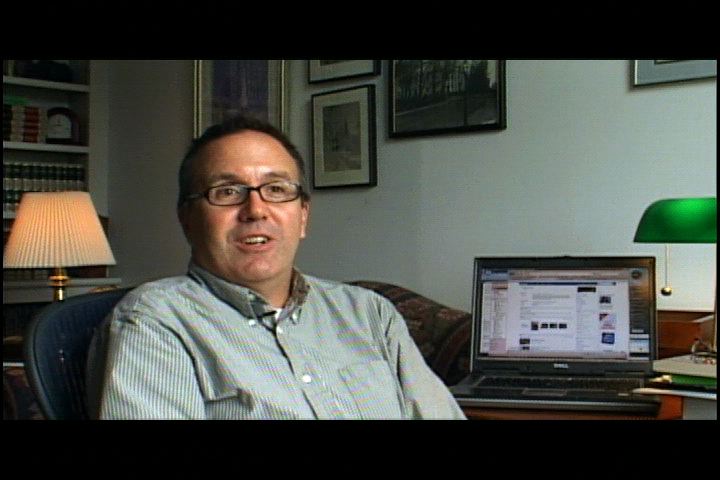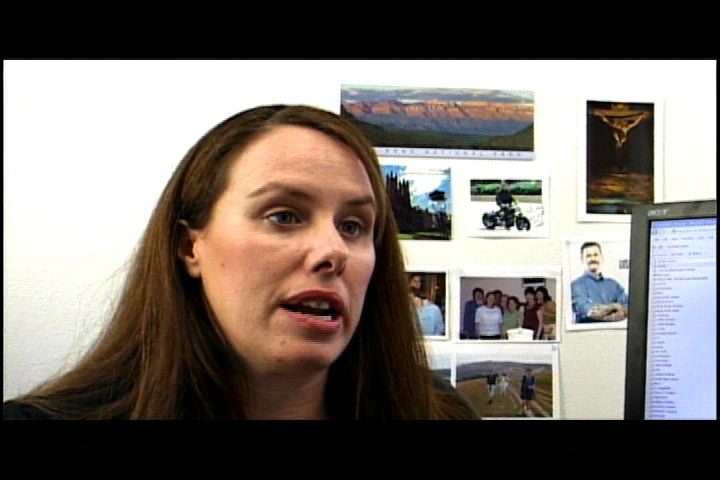In This Episode << SLIDE LEFT TO SEE ADDITIONAL SEGMENTS
Online Religion
LUCKY SEVERSON: The Park Street Church on the Boston Common has witnessed two centuries of American history. John Adams and Paul Revere are buried in the old Granary graveyard next door. In their time, church services were usually limited to the reach of the pastor’s voice.
Pastor DANIEL HARRELL (Park Street Church, reading from the Book of Revelation): She held the golden cup in her hands filled with abominable things.)
SEVERSON: That would have made it more difficult for Pastor Daniel Harrell, one of the ministers here, to carry out his experiment. He wanted his congregation to explore the Old Testament Book of Leviticus by actually living according to its archaic laws for one month and then to log their experiences on the Internet.
Pastor HARRELL: I think there was probably some fear. Sort of given the reputation of the burdensomeness of the law, how in the world would we follow this? But I managed to do a little coercion and put on some, a little bit of pastoral guilt and, you know, had some folks sign up, and it ended up being a great group, very diverse.
SEVERSON: It ended up being another illustration of the power of online religion. Browse the Internet, and there are examples everywhere: a Web site called GodTube, for instance, which was founded in 2007 and now attracts more than a million-and-a-half visitors a month. One of the site’s most popular videos is a little girl reciting the 23rd Psalm.
UNIDENTIFIED YOUNG GIRL (from GodTube video): Even though I walk through the valley of the shadow of death . . .
SEVERSON: Hundreds of religious organizations are reaching and connecting believers of most every kind around the globe. For Jews, there’s a Web site called JewTube; for Muslims, one called Muxlim.com. There are Hindu and Buddhist sites, and for those not quite as mainstream, Web sites as diverse as The Virtual Church of the Blind Chihuahua, which is actually a site that reflects about man’s relation to God. Nowadays, with the latest technology, virtual churches provide a 3-D space where the user can walk in, sit down, and listen to a sermon. The very first virtual church, the First Church of Cyberspace, was founded at this real church in Montclair, New Jersey back in the Internet Dark Ages — 1994 — by then pastor Charles Henderson.
Pastor CHARLES HENDERSON (Founder, First Church of Cyberspace and Editor, CrossCurrents Quarterly): It was really overwhelming. I mean, here I was, the minister of a local congregation in New Jersey, and somehow I came up with this idea of the First Church of Cyberspace and within about three months I was in The New York Times, Wall Street Journal, on television and radio. I mean, it was just explosive, and here I was doing something that now would be regarded as incredibly simple and primitive.
SEVERSON: What helped make Pastor Harrell’s Leviticus project a success was actually the secular Web site Facebook, which allows people to interact with friends and strangers almost instantly.
Pastor HARRELL: I thought, why don’t we do it in a way that allows people in our congregation to engage a conversation with folks who are actually trying to abide by it, much like the ancient Israelites would have, as well as followers of the Old Testament throughout history? But to do that in public fashion, you know, could have been difficult if not for a vehicle like Facebook.
SEVERSON: Heidi Campbell is a professor at Texas A&M University and author of the book “Exploring Religious Community Online.” She says there are very tangible reasons why the religious experience through chat rooms and social networking sites has increased in popularity — online prayers, for example.
Dr. HEIDI CAMPBELL (Assistant Professor, Department of Communication, Texas A&M University and Author, “Exploring Religious Community Online”): In fact, some of the people in my early research said that they felt more cared for and that people, when they said they were praying for them online, that they really meant it because there was some tangible artifact that they could see to really show that they were praying for them.
SEVERSON: She says the Internet extends the “global body of Christ” because someone or some prayer is always there, and she says for those too shy or introverted to speak up in church, the Internet offers anonymity.
Dr. CAMPBELL: That anonymous nature allows them to ask the questions, to get the feedback, to say things that they would never be able to say in a face-to-face environment.
SEVERSON: This is Cathleen Falsani’s Webs site. She is a columnist for the Chicago Sun-Times and author of two books, “The God Factor” and, most recently, “Sin Boldly.” She signed up for Facebook fishing for contacts. But before long she was connecting regularly with old friends and new friends.
CATHLEEN FALSANI (Columnist, Chicago Sun-Times and Author, “The God Factor”): I happened to have the laptop open in bed, and I saw one friend of mine’s status update pop up and change, and it said, “I’m really sad that Mark died today.” I said, “Please tell me you’re kidding.” I didn’t hear anything back. So I emailed another friend, and shortly after that he said, “No, Mark was killed this morning.”
SEVERSON: Their friend Mark was killed while in the lead Humvee of a convoy outside Sadr City, Iraq.
Ms. FALSANI: We ended up mourning online because we’re all over the place, and it was just a way to sort of talk about Mark, and there was a little memorial that sort of started there, and then it moved to its own Web site, but we kept talking.
SEVERSON: Falsani says online conversations often turned to issues of theology and spirituality.
(to Ms. Falsani): You speak of it almost in a spiritual way.
Ms. FALSANI: Yeah. We started — a number of us started calling it kind of flippantly a while ago “church.” It feels like church. But it really has, for some of us, become church.
SEVERSON: Falsani was surprised that a secular Web site like Facebook could become, for her, an online church. Pastor Harrell was equally surprised at the response on Facebook to his Leviticus challenge. He says people with no connection to his congregation posted their comments about the experiences members recorded while attempting to live and dress and eat according to the word of God in Leviticus.
THOMAS KEOWN (speaking in Facebook video): The man should put his hand on the head of the animal.
SEVERSON: Those members who attempted the experiment called themselves Levites, and some, like Thomas Keown, made their own videos to share on Facebook. His was a humorous look at a visit to his family farm in Ireland where he tried to touch the head of a cow as Leviticus instructs. The cow apparently didn’t see the humor.
Mr. KEOWN: I think it’s completely free of defects, but free of any interest in allowing me to put my hand on their head.
So Facebook was the primary means by which this experiment was public. It was the way that people outside the church and inside the church were able to play their part in it, were able to be part of what we, as a small group, were doing.
SEVERSON: Kristi Vrooman made her Facebook video about the search for meat that complies with Leviticus standards.
KRISTI VROOMAN (speaking in video): And these animals were not, were not injected with hormones?
UNIDENTIFIED GROCERY STORE CLERK: They were all free-range.
Ms. VROOMAN: It surprised all of us, really, that people outside of our own church, outside of our religious tradition were commenting — people from Sweden, people from Israel.
Pastor HARREL: It certainly has added a layer of connection that would have been difficult to otherwise create. I guess the question, or the jury, is still out as to whether that will supplant, you know, the kind of connection that we actually like to have in real time.
SEVERSON: Skeptics of online religion say it’ll never match the church experience — the social experience where the faithful know one other, share coffee and conversation, look each other in the eye. They say Internet religion is religion-lite. Its defenders disagree.
Ms. FALSANI: It was completely counterintuitive to me, and I could not have imagined this kind of blessing, this kind of communion and community — and we use the word “community” tongue-in-cheek but also seriously, coming about from a piece of technology. I just — I wouldn’t have believed it if it hadn’t happened to us. But it did.
SEVERSON: Critics of online religion say it might work for an individual, but it doesn’t foster family togetherness. Pastor Harrell says he is aware of the criticism, but now he is also more aware of the Internet’s possibilities.
Pastor HARRELL: You know, it is in the end a tool, you know, that can be employed for good or evil, I guess, and we’d like to think we’re using it for good.
SEVERSON: Charles Henderson, who is now the editor of CrossCurrents Quarterly, says the Internet should not replace the real thing.
Mr. HENDERSON: I think that the experience online has to be considered as a supplement to real friendships and real community life in local congregations. It’s not a replacement for that kind of real community, although some people do use it as a substitute for religious community. I don’t think that is the ideal.
SEVERSON: But for Cathleen Falsani and others like her, the old-time church is being replaced, for now, by religion on the Internet.
Ms. FALSANI: You know, I was finding that I was getting more hurt by congregational life than I was being fed and that I could find that elsewhere and still be safe spiritually. And so this is a beautiful thing for someone like me to have, and I’m not the only one who’s experienced that in the group.
SEVERSON: Although most churchgoers still prefer religion the old-fashioned way, an increasing number, especially those under 30, are exploring religion online. A study in 2001 by the Pew Research Center found that one-in-four adults use the Internet for religious and spiritual purposes. That was seven years ago. Today, the number is probably considerably higher.
For RELIGION & ETHICS NEWSWEEKLY, I’m Lucky Severson reporting.










